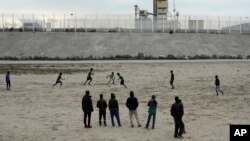In thick fog, Nasir helped load his young family's scant possessions into a van and turned his back on the beaten-up caravan that has been home for the past nine months in a migrant camp known as the "Jungle" in northern France.
In a few days, the French government will begin dismantling the filthy, ramshackle camp outside Calais that has become a searing symbol of Europe's struggle to respond to an influx of migrants fleeing war and poverty.
Nasir, a 23-year-old Afghan, doesn't want to wait for the bulldozers to move in and raze the camp as winter approaches.
Instead, he, his wife Nabila and their 7-month old infant are joining one of the last voluntary resettlement convoys bound for reception centers across France.
"We just want a life, nothing more," Nasir told Reuters in broken English.
A Union Jack flag painted on his caravan is a poignant reminder of Nasir's now-dashed dreams of a better life in Britain, barely 33 km (21 miles) away across the English Channel and the preferred destination of almost all migrants in Calais.
No one knows for sure how many have made the perilous crossing from France to Britain, sometimes stowed away in the back of lorries or clinging to the undersides of trains.
Thousands have however failed, including Nasir, thwarted by barbed wire-topped fencing lining the highway between the camp and the Calais ferry port, by police patrols as well as a battery of security cameras. Now a wall is being built on the port's approach road to serve as a further deterrent.
President Francois Hollande said last month that France would completely shut down "the Jungle" by the end of the year.
The plan is to relocate migrants in small groups around the country, largely removing the option of forging a new life in Britain. Nasir now hopes France will grant him asylum.
"On the one hand, closing the Jungle is good. There is nothing, no future here," Nasir said. "The Jungle is not fit for humans, it's for animals."
Destination southwestern France
A new census on Tuesday showed there are about 6,500 migrants holed up in the camp, though aid workers say the number is closer to 10,000. Most are from countries like Afghanistan, Sudan and Eritrea, and increasingly Syria.
A small crowd encircled Nasir and exchanged farewells before a state worker drove the family to the bus waiting to transfer them to a reception center in Merignac on the outskirts of Bordeaux in distant southwestern France.
The migrants cannot choose where they end up and even as France prepares to shut the "Jungle", many still target Britain.
"England, England!" shouted one Afghan teenager as Nasir bid his goodbyes.
Ahead of a presidential election next April, Hollande has faced mounting public pressure to dismantle the camp and relocate its inhabitants. Conservative opponents have raised the heat, accusing the Socialist president of mismanaging a problem they say is ultimately a British one.
Hollande reminded Britain two weeks ago that it had a role to play in managing the flow of migrants. He said that were France to stop preventing the migrants from leaving French soil, Britain would find itself obliged to deal with them when they landed on its shores.
Vincent Berton, a senior official in the Calais town hall, described the camp closure as a "humanitarian operation", and said that more than 6,000 Jungle migrants had been moved to reception centers in the past 12 months. An average of three bus-loads were leaving each week, he said.
Yet Hollande's plans are meeting stiff local resistance in some towns where the 160 reception centers have been set up.
Last week shots were fired at two planned migrant centers, one in the western seaside resort town of Saint Brevin and the other in Saint-Hilaire-du-Rosier in southeastern France, a conservative stronghold.
In the southern village of Allex, the mayor sought to hold a local referendum on whether to accept its quota of 50 migrants before regional officials blocked the vote in court.
Such resistance highlights the balancing act the government faces upholding humanitarian obligations and pleasing voters as Europe searches for a coherent response to the migration crisis.
"I want to stay in France, if France wants me," said Rawaz Rawchy, 33, an Iraqi Kurd, as he boarded the bus.
"We have to leave now. My children can no longer sleep because of the cold."





